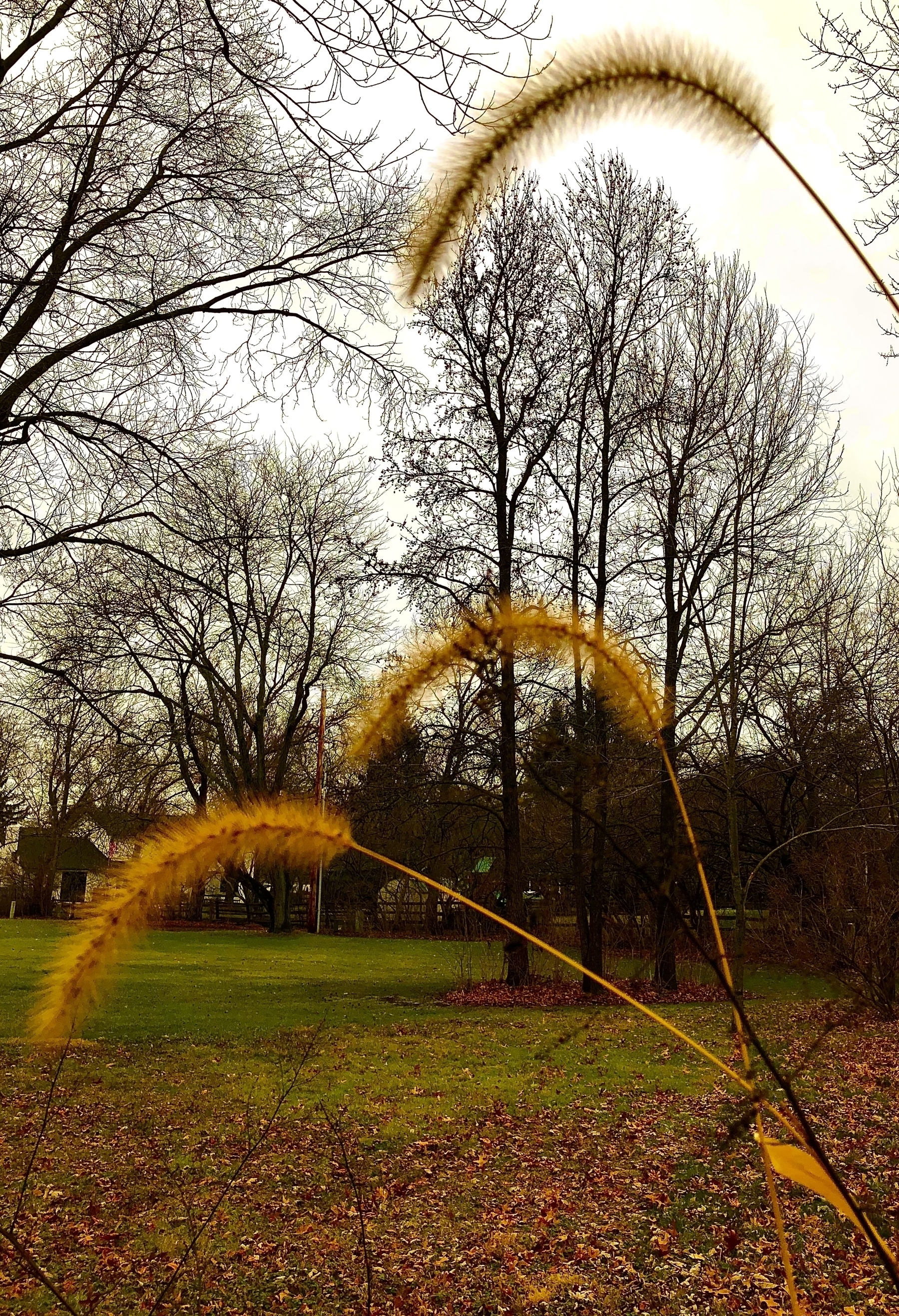29 December 2021
’Idál, 19 Masá’il (Questions), 178 B.E.
Seen
Another gray day accented by golden giant foxtail …

Done
Added services to the writing / research / publishing category on Greener Acres Value Network Timebank in readiness for documenting time on blog posting, email correspondence, and social media participation.
Gained perspective in a conversation with GAVNet curator, Bill Fulkerson, about the changing nature of work. Traditionally, we associate work with employment. This leads to a binary labeling of people—they are either employed or unemployed. Concern shifts to how to get the number of unemployed as close to zero as possible and thereby reach the ideal end state of “full employment.” It is not a problem to exclude those who are unemployable due to age, health, capability, etc. from the count. But if a person is deemed employable, yet is not, it must be due to some character flaw in that individual or attributed (by unfettered prejudice) to a group of people to which that person belongs (more labeling). Accordingly, there is a strong resistance to state-funded welfare programs that provide assistance to those who are determined to be able but unwilling to work.
As a consequence of the ongoing pandemic and a seemingly unrelenting wave of natural disasters, many have been removed / displaced from traditional employment. Commensurately, a growing number are “working” from home in non-traditional roles as independent contractors and small business owners or unpaid providers of essential services such as childcare, healthcare, eldercare, home schooling, meal preparation, home care, etc. to family members and close friends who are unable to do so for themselves. Under these conditions, the distinctions between “visible work” counted in traditional employment measures and “invisible work,” which is critical for a functional society but not officially counted, is increasingly blurred. In other words, a lot of “good people” are unemployed / underemployed which means we must have a REAL problem!
Bill proposes the term, “meaningful engagement,” which implies a certain degree of “fuzziness” as in the application of “fuzzy logic” to better understand human behavior in complex social systems. This approach has merit when considering how individuals live out their economic lives across a complex landscape of multiple workplaces in which to deliver value, multiple platforms for communications, and multiple currencies / mediums of exchange in which to be paid. And at the heart of this complexity is the basic issue that all one has to give is one’s time, 24 hours / day, for as many days as we are allowed. How do we make the exchange of one’s time for one’s survival and quality of life as efficient and effective as possible so that as many as can may benefit from what each has to offer?
Outlined upcoming posting to Micro.blog about game plan for 2021.
Slowly, but slowly …
Noted
Joy is receiving a box of holiday goodies from the chef of the family …

Astral Prospecting on Instagram and Astral Prospecting on Facebook
Marc Bosserman on Instagram Marc Bosserman on Facebook, and Marc Bosserman Music and Musings on YouTube
A new YouTube posting by my granddaughter!
Tab’s Galaxy on YouTube | ASMR Tapping on glass objects
Quoted
At the time I met ‘Abdu’l-Bahá, in the spring of 1912, He was sixty-eight years of age. Of these, twelve years had been spent in exile with His spiritual as well as physical father, Bahá’u’lláh, in Baghdád, Constantinople, and Adrianople. Then forty years, to a day, in the Turkish prison-fortress of ‘Akká, ten miles from Mt. Carmel, on the coast of Palestine. Because of their staunch adherence to their faith in Bahá’u’lláh as the Manifestation of God, ‘Abdu’l-Bahá with about seventy others, had sacrificed all that they had, preferring imprisonment and inward freedom with Him to outward freedom and spiritual bondage without Him. With the overthrow of the tyrannous reign of ‘Abdul-Hamid, by the Young Turk Party in 1908, this long exile and imprisonment ended and that voice and presence was free to prove to the world what He had so completely demonstrated, that the only prison is the prison of self.
To what marvelous inner life of the spirit could be ascribed, I asked myself, the fact that this man, born of a long line of Persian nobility, accustomed to every luxury until his eighth year; followed by a half-century of exile, torture, and prison-life, could emerge into the modern world of Paris, London, and New York and dominate every experience with a calm control of circumstance; a clarifying exposure of superficialities; a joyous love for all humanity, which never condemned but with forgiveness brought shame?
It is with the hope that, to a degree, the following pages may approach an answer to this question that they are offered to the reader. 1
My sister and brother-in-law recently relocated and chose to donate several books in their library rather than move them. Many of these volumes are not well-known, but due to the topics they cover and the manner in which their authors explore them, they warrant a nod of recognition before being sent on their way. Accordingly, most quotes referenced in the “Quoted” section come from these books. Maybe they will stir (or renew) your interest, too.
- Ives, Howard Colby. Portals to Freedom. 1st Edition, Bahá’í Publishing Trust, 2012, 6. [return]